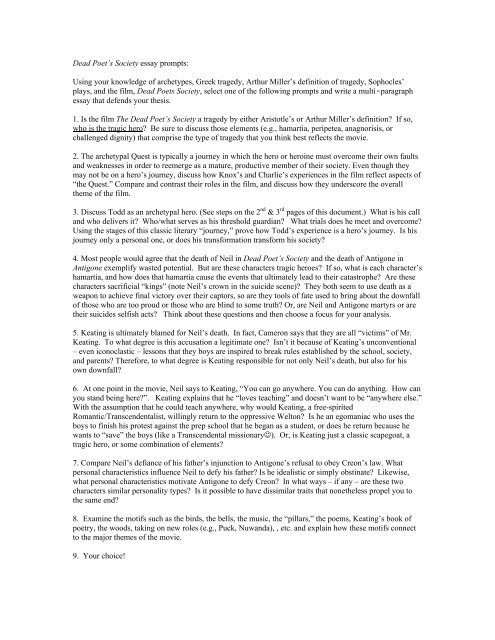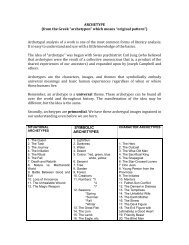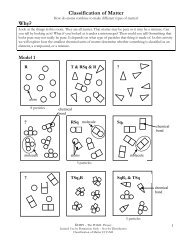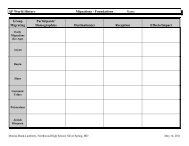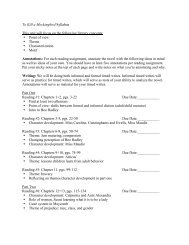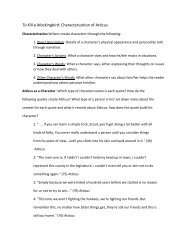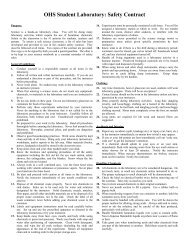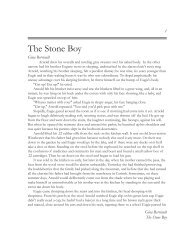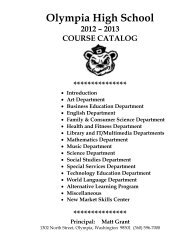here for the prompts
here for the prompts
here for the prompts
You also want an ePaper? Increase the reach of your titles
YUMPU automatically turns print PDFs into web optimized ePapers that Google loves.
Dead Poet’s Society essay <strong>prompts</strong>:<br />
Using your knowledge of archetypes, Greek tragedy, Arthur Miller’s definition of tragedy, Sophocles’<br />
plays, and <strong>the</strong> film, Dead Poets Society, select one of <strong>the</strong> following <strong>prompts</strong> and write a multi‐paragraph<br />
essay that defends your <strong>the</strong>sis.<br />
1. Is <strong>the</strong> film The Dead Poet’s Society a tragedy by ei<strong>the</strong>r Aristotle’s or Arthur Miller’s definition? If so,<br />
who is <strong>the</strong> tragic hero? Be sure to discuss those elements (e.g., hamartia, peripetea, anagnorisis, or<br />
challenged dignity) that comprise <strong>the</strong> type of tragedy that you think best reflects <strong>the</strong> movie.<br />
2. The archetypal Quest is typically a journey in which <strong>the</strong> hero or heroine must overcome <strong>the</strong>ir own faults<br />
and weaknesses in order to reemerge as a mature, productive member of <strong>the</strong>ir society. Even though <strong>the</strong>y<br />
may not be on a hero’s journey, discuss how Knox’s and Charlie’s experiences in <strong>the</strong> film reflect aspects of<br />
“<strong>the</strong> Quest.” Compare and contrast <strong>the</strong>ir roles in <strong>the</strong> film, and discuss how <strong>the</strong>y underscore <strong>the</strong> overall<br />
<strong>the</strong>me of <strong>the</strong> film.<br />
3. Discuss Todd as an archetypal hero. (See steps on <strong>the</strong> 2 nd & 3 rd pages of this document.) What is his call<br />
and who delivers it? Who/what serves as his threshold guardian? What trials does he meet and overcome?<br />
Using <strong>the</strong> stages of this classic literary “journey,” prove how Todd’s experience is a hero’s journey. Is his<br />
journey only a personal one, or does his trans<strong>for</strong>mation trans<strong>for</strong>m his society?<br />
4. Most people would agree that <strong>the</strong> death of Neil in Dead Poet’s Society and <strong>the</strong> death of Antigone in<br />
Antigone exemplify wasted potential. But are <strong>the</strong>se characters tragic heroes? If so, what is each character’s<br />
hamartia, and how does that hamartia cause <strong>the</strong> events that ultimately lead to <strong>the</strong>ir catastrophe? Are <strong>the</strong>se<br />
characters sacrificial “kings” (note Neil’s crown in <strong>the</strong> suicide scene)? They both seem to use death as a<br />
weapon to achieve final victory over <strong>the</strong>ir captors, so are <strong>the</strong>y tools of fate used to bring about <strong>the</strong> downfall<br />
of those who are too proud or those who are blind to some truth? Or, are Neil and Antigone martyrs or are<br />
<strong>the</strong>ir suicides selfish acts? Think about <strong>the</strong>se questions and <strong>the</strong>n choose a focus <strong>for</strong> your analysis.<br />
5. Keating is ultimately blamed <strong>for</strong> Neil’s death. In fact, Cameron says that <strong>the</strong>y are all “victims” of Mr.<br />
Keating. To what degree is this accusation a legitimate one? Isn’t it because of Keating’s unconventional<br />
– even iconoclastic – lessons that <strong>the</strong>y boys are inspired to break rules established by <strong>the</strong> school, society,<br />
and parents? T<strong>here</strong><strong>for</strong>e, to what degree is Keating responsible <strong>for</strong> not only Neil’s death, but also <strong>for</strong> his<br />
own downfall?<br />
6. At one point in <strong>the</strong> movie, Neil says to Keating, “You can go anyw<strong>here</strong>. You can do anything. How can<br />
you stand being <strong>here</strong>?”. Keating explains that he “loves teaching” and doesn’t want to be “anyw<strong>here</strong> else.”<br />
With <strong>the</strong> assumption that he could teach anyw<strong>here</strong>, why would Keating, a free-spirited<br />
Romantic/Transcendentalist, willingly return to <strong>the</strong> oppressive Welton? Is he an egomaniac who uses <strong>the</strong><br />
boys to finish his protest against <strong>the</strong> prep school that he began as a student, or does he return because he<br />
wants to “save” <strong>the</strong> boys (like a Transcendental missionary). Or, is Keating just a classic scapegoat, a<br />
tragic hero, or some combination of elements?<br />
7. Compare Neil’s defiance of his fa<strong>the</strong>r’s injunction to Antigone’s refusal to obey Creon’s law. What<br />
personal characteristics influence Neil to defy his fa<strong>the</strong>r? Is he idealistic or simply obstinate? Likewise,<br />
what personal characteristics motivate Antigone to defy Creon? In what ways – if any – are <strong>the</strong>se two<br />
characters similar personality types? Is it possible to have dissimilar traits that none<strong>the</strong>less propel you to<br />
<strong>the</strong> same end?<br />
8. Examine <strong>the</strong> motifs such as <strong>the</strong> birds, <strong>the</strong> bells, <strong>the</strong> music, <strong>the</strong> “pillars,” <strong>the</strong> poems, Keating’s book of<br />
poetry, <strong>the</strong> woods, taking on new roles (e.g., Puck, Nuwanda), , etc. and explain how <strong>the</strong>se motifs connect<br />
to <strong>the</strong> major <strong>the</strong>mes of <strong>the</strong> movie.<br />
9. Your choice!
THE HERO’S JOURNEY <br />
I. DEPARTURE <br />
A. Step One: The call to adventure <br />
• The initiate has something taken that he wishes to reclaim. <br />
• The initiate senses that he’s lacking something. <br />
• The initiate wants to save or restore honor. <br />
• The initiate goes to win rights <strong>for</strong> his people. <br />
1. Supernatural Aid-‐-‐once <strong>the</strong> call is accepted (consciously or <br />
unconsciously) a guide or magical helper will appear/become known. <br />
2. Threshold Guardian(s)-‐-‐protect and/or point <strong>the</strong> way <br />
(NOTE: It’s possible <strong>for</strong> <strong>the</strong> hero to “Refuse <strong>the</strong> Call,” which may be caused by a sense of duty, <br />
obligation, fear, insecurity, or inadequacy. Eventually, however, she will heed <strong>the</strong> call.) <br />
B. Step Two: Threshold <br />
• The interface between <strong>the</strong> known and <strong>the</strong> unknown <br />
• The hero crosses into <strong>the</strong> field of adventure; leaves known world; <br />
rules and limits are not known. <br />
• Hero shows willingness to undergo a metamorphosis; to allow <strong>the</strong> old self <br />
to die. <br />
II. INITIATION INTO THE UNKNOWN <br />
A. Step Three: Challenges & Temptations <br />
• Series of tests, tasks, or ordeals <strong>the</strong> hero experiences to begin his <br />
trans<strong>for</strong>mation. These trials usually occur in threes. <br />
• Hero is usually aided by <strong>the</strong> supernatural. <br />
1. The meeting with <strong>the</strong> Goddess-‐-‐represents <strong>the</strong> time when hero experiences an all <br />
powerful, all encompassing, unconditional love. Sacred marriage or union of <br />
opposites (may take place within <strong>the</strong> character, ra<strong>the</strong>r than with a woman). <br />
2. Woman as Temptress-‐-‐hero strays from quest because of some kind of lust. <br />
B. Step Four: Abyss <br />
• Faces greatest challenge that <strong>for</strong>ces initiate to surrender himself completely <br />
to greatest fear. <br />
• Alone <br />
• “Face Dragon” <br />
1. Atonement with <strong>the</strong> Fa<strong>the</strong>r-‐-‐hero confronts and is initiated by whatever holds <br />
<strong>the</strong> ultimate power in his/her life. CENTER POINT IN THE JOURNEY/ALL PREVIOUS <br />
STEPS HAVE BEEN LEADING TO THIS; ALL FUTURE WILL COME FROM THIS <br />
EXPERIENCE (Fa<strong>the</strong>r is seen as “fearsome,” even a demon. If hero surrenders to this <br />
figure and trusts it, he achieves peace.) <br />
C. Step Five: Revelation and Trans<strong>for</strong>mation: <br />
• A part of <strong>the</strong> initiate dies so that a new part can be born. <br />
• New way of thinking <br />
1. Apo<strong>the</strong>osis-‐-‐to apo<strong>the</strong>osize is to deify. In this stage, <strong>the</strong> hero lives in spirit; <br />
moves to a state of divine knowledge, love, compassion, bliss. It’s a period of
est, peace and fulfillment be<strong>for</strong>e <strong>the</strong> hero begins <strong>the</strong> return. <br />
D. Step Six: Atonement <br />
• Hero is “at one” with his new self. Fully reborn. <br />
• In harmony with life and <strong>the</strong> world. The imbalance which sent hero on <strong>the</strong> <br />
journey has been corrected. <br />
• Achievement of <strong>the</strong> goal of <strong>the</strong> quest; may be something transcendent; a <br />
plant that supplies immortality; <strong>the</strong> holy grail. <br />
III. THE RETURN: <br />
• Return to known world to give something to his/her society. <br />
• Hero discovers his/her gift, which has been bestowed based on a new skill or <br />
awareness. (“Gift of <strong>the</strong> Goddess”) <br />
• Sometimes gift is rejected; hero is ostracized or even killed <strong>for</strong> <strong>the</strong>ir <br />
message/gift. <br />
****************************************************************** <br />
T he Hero’s Journey in Twelve Easy Steps: <br />
1. Heroes are introduced in <strong>the</strong> ORDINARY WORLD, w<strong>here</strong> <br />
2. <strong>the</strong>y receive <strong>the</strong> CALL TO ADVENTURE. <br />
3. They are RELUCTANT at first or REFUSE THE CALL, but <br />
4. are encouraged by a MENTOR to <br />
5. CROSS THE FIRST THRESHOLD and enter <strong>the</strong> Special World, w<strong>here</strong> <br />
6. <strong>the</strong>y encounter TESTS, ALLIES, AND ENEMIES. <br />
7. They APPROACH THE INMOST CAVE, crossing a second threshold <br />
8. w<strong>here</strong> <strong>the</strong>y endure <strong>the</strong> ORDEAL. <br />
9. They take possession of <strong>the</strong>ir REWARD and <br />
10. are pursued on THE ROAD BACK to <strong>the</strong> Ordinary World. <br />
11. They cross <strong>the</strong> third threshold, experience a RESURRECTION, and are <br />
trans<strong>for</strong>med by <strong>the</strong> experience. <br />
12. They RETURN WITH THE ELIXIR, a boon or treasure to benefit <strong>the</strong> Ordinary World.


